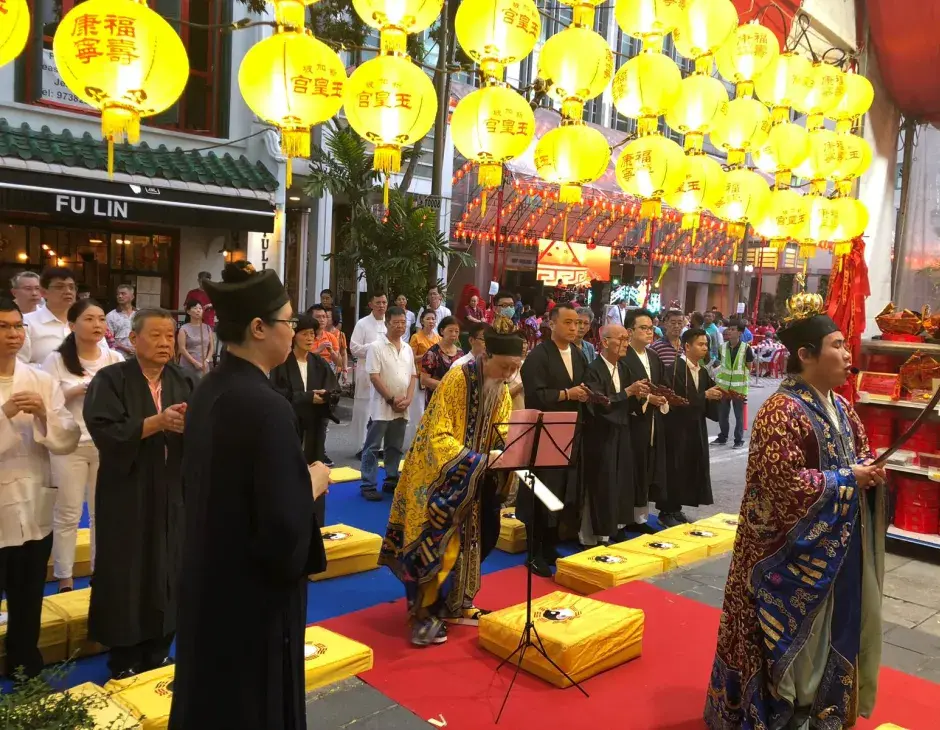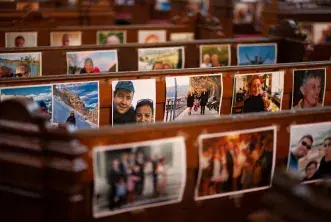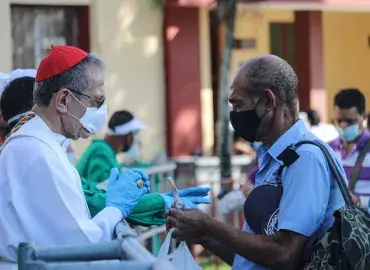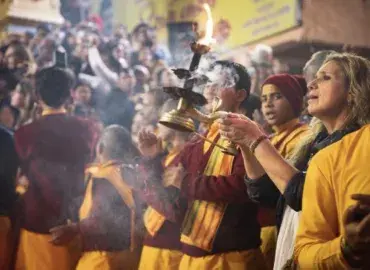Religion brings people together. As health officials around the world discourage unnecessary contact that may lead to COVID-19 infection, the crisis gives rise to social distancing and self-isolation. Many KAICIID Fellows are leading these efforts in their local and global faith communities, offering practical solutions and hope amid confusion and panic.
In Europe, now the epicentre of the current coronavirus pandemic, governments are banning public gatherings and restricting free movement. Many houses of worship have closed.
2015 Fellow Mabrouka Rayachi, Supervisor for Islamic Religious Teachers in Lower Austria in the Ministry of Education and Official Islamic Authority in Austria, said members of her local Muslim community have started bowing to greet one another instead of hugging, kissing, or shaking hands and are meeting online rather than at the mosque.
“In my community of about 70 women in Vienna, we decided to share 30 chapters of the Quran. Everyone reads her own part with the intention to ask God to release the burden of the COVID-19 crisis from relatives, friends, and humanity,” Rayachi said. “We use Facebook and WhatsApp to exchange information and are spending valuable time with our children. This difficult moment is a precious opportunity for us to focus on love and solidarity.”
That love and solidarity includes serving the greater community and taking care of older neighbours who are particularly vulnerable to infection.
In the U.K., 2015 Fellow Rabbi Alexander Goldberg is Dean of the College of Chaplains and Coordinating Chaplain at the University of Surrey, home to 16,000 students and 2,000 staff. His team of Christian, Muslim, Jewish, Hindu, Buddhist, Sikh, Baha’i, and Humanist chaplains are praying for and providing pastoral care to self-isolated and quarantined community members using video conferencing services and WhatsApp groups.
“We’re setting up buddy systems via those groups so that people in isolation can be contacted and have a stream of online visitors and chats,” Rabbi Goldberg said. “We’re setting up small prayer groups too. The most worrying thing about isolation is feeling alone. We’re trying to break that misery.”
His team of chaplains is also implementing practical changes to limit the virus’s spread. Christians are no longer sharing sacramental wine, Jews have been asked not to kiss mezuzahs and Torah scrolls, and Hindus were advised to throw coloured powder rather than press it directly onto people’s faces during the recent Holi festival.
As official recommendations to reduce transmission of the coronavirus become stricter each day, Rabbi Goldberg is often left with more questions than answers.
“We have Ramadan coming up. If people are isolated, how do we supply dates and food to help them break the fast? We also have Passover coming up. How do we deliver matzah and kosher products to students if they are isolated? How do we perform birth and circumcision rituals under quarantine and lockdown? Will synagogues still be open for bar mitzvahs?” Rabbi Goldberg wondered.
2016 Fellow Rabbi Jeff Berger, Multi-Faith Chaplain to the Hertfordshire Constabulary in the U.K., is advising elderly people, those at risk due to respiratory illnesses, and anyone with cold or flu symptoms to listen to religious services online rather than attending synagogue. Volunteers are reaching out to the most vulnerable with phone calls, home visits, and help with chores.
In Singapore, which has received praise for its so far successful efforts to contain the new coronavirus, 2019 Fellow Master Tan Zhixia has led Taoist rituals and prayers for wellness and peace at the Temple of the Heavenly Jade Emperor Yu Huang Gong where she serves as Priest-in-Residence. Entry to the temple has been restricted, but worship continues at its gate.
“Our elders were advised to reduce prayer visits to the temple, and we’ve cancelled activities to deter them and reduce public contact,” she said. “We had to cancel one of our most significant events, a celebration for the feast day of our Supreme Patriarch Laozi, and have requested devotees to observe the forthcoming Qingming Festival (Tomb-Sweeping Day) during weekdays to avoid public congestion at crematoriums and cemeteries.”
Fellows in Sub-Saharan Africa, which started registering COVID-19 cases later than much of the world, hope early intervention efforts can still spare their communities some of the turmoil other regions face.
2018 Fellow Sister Rose Kyaligonza, Lecturer in the Department of Religious Studies at St. Augustine University of Tanzania, said congregants at her church are following most Catholic communities around the world in refraining from using communal holy water to make the Sign of the Cross, no longer shaking hands when sharing the sign of peace, and receiving the Holy Communion by hand rather than directly by tongue.
“We are praying for God’s intervention in this COVID-19 crisis, asking for healing, and praying for protection over those who are not yet infected,” Kyaligonza said. “We pray for God to have mercy on his people and for a cure to be obtained.”
2019 Fellow Father Stephen Ojapah, a Catholic Priest of the Missionary Society of Saint Paul of Nigeria (MSP), is leading interfaith prayers for Christians and Muslims in the local Hausa language from his diocese in northwest Nigeria. 2018 Fellow Mohammed Kassim, Director of the Academic Administration Department at the Islamic University College, Ghana, said his community has replaced congregational activities with home worship.
The same is true in Latin America, where 2015 Fellow Victoria Peláez, Coordinator for the Guatemalan Interreligious Dialogue for Development, reports Lenten and Holy Week gatherings have been cancelled and Christians are being encouraged to follow Mass by radio, TV, or Facebook Live.
In India, where confirmed COVID-19 cases are just starting to escalate, different communities are taking different approaches.
2019 Fellow Yudhistir Govinda Das, Country Director of Communications for the International Society for Krishna Consciousness (ISKCON) in India, said Hare Krishnas are avoiding mass gatherings and festivals, cleaning temples with disinfectant, and providing resident monks with masks and hand sanitizer.
“Special prayer and kirtan (traditional call-and-response) ceremonies are being held in small groups to pray to Lord Krishna for those affected and for the protection of others,” he said. “We are also chanting the Dhanvantari Mantra, a special prayer to the Supreme Lord in his form of the healer for the health and wellbeing of all.”
Where temples have closed to the public, live video streams allow worshippers to take part in puja prayer rituals and see deities from home. ISKCON’s Food for Life programme is also helping several government agencies distribute food to the elderly and others vulnerable to COVID-19.
2019 Fellow Kenu Agarwal coordinates interfaith efforts for the social organisation Ahimsa Vishwa Bharti in Delhi. Worshippers from her Hindu community have recently started reciting the Mahamrityunjaya Mantra to ward off untimely death. “Both faith leaders and devotees have faith in God and their prayers,” she said.
2015 Fellow Yusuf Daud, Director of the SophiaCitra Institute’s PhiloSufi Centre for Interfaith and Intercultural Dialogue in Indonesia, has coordinated interfaith prayers across six faiths and 18 provinces to address the coronavirus. He sees a silver lining to the current crisis.
“We ought not necessarily consider illness as our enemy. Rather, we may see it as a mechanism of the body to cleanse, purify, and balance us on physical, emotional, mental, and spiritual planes,” he said.
As the COVID-19 crisis continues to unfold, as uncertainty fuels anxiety and physical isolation becomes an uncomfortable necessity for so many, KAICIID’s Fellows and all religious leaders will continue to play a vital role by responsibly bringing communities together in shared worship and response.
During the course of the pandemic, religious leaders have often found themselves on the frontlines of the global health crisis…
A public health tragedy, an economic disaster, a crisis that has ripped communities apart — the global trauma of COVID-19 is…
On 2 June 2016, the Buenos Aires legislature passed, with a significant majority, a law which declares the Argentine capital…






![Claudio Epelman is the Executive Director of the Latin American Jewish Congress, regional branch of the World Jewish Congress, & the Representative to the Holy See of the World Jewish Congress. [file:field-file-image-alt-text]](/sites/default/files/styles/cards_360_270_scale_crop/public/epelman_claudio.jpg.webp?h=b4655082&itok=vNaRBYPP)